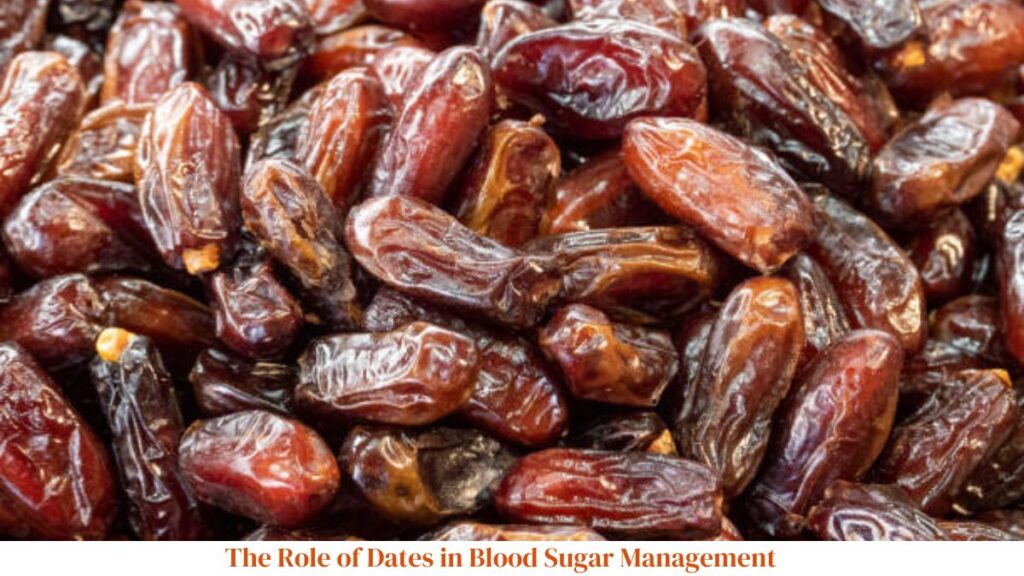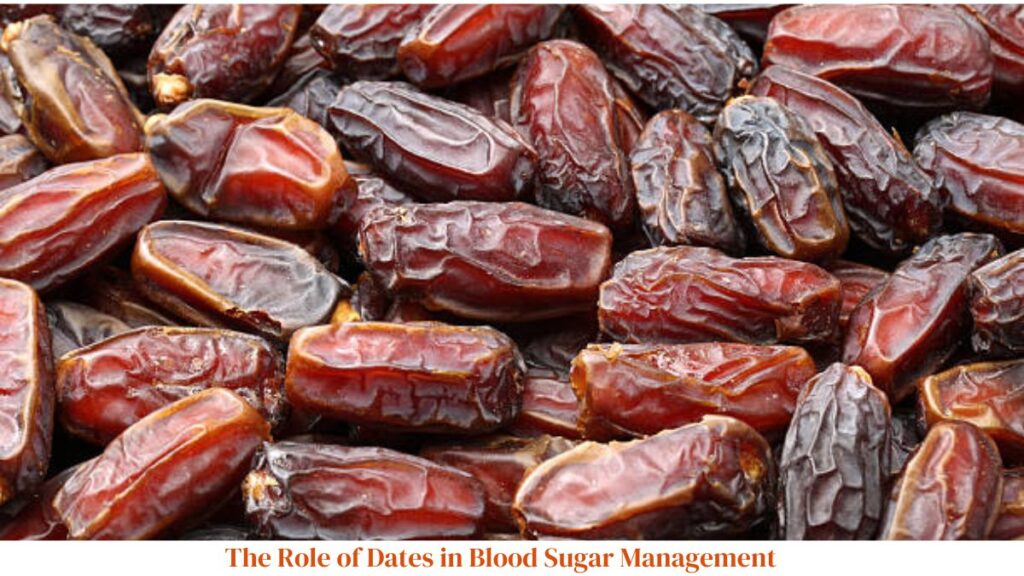Introduction:-
“Savoring Stability: The Role of Dates in Blood Sugar Management”

In the quest for stable blood sugar levels, nature often holds the key to a balanced and healthy lifestyle. Among the many natural remedies, dates stand out for their remarkable ability to contribute to blood sugar management. From their delicious taste to their nutritional composition, dates offer a wholesome solution to those seeking stability in their blood sugar levels.
Understanding Dates and Blood Sugar Regulation:
Dates, the succulent fruits harvested from date palm trees, boast an impressive nutritional profile. Rich in fiber, vitamins, and minerals, they play a crucial role in regulating blood sugar levels. The high fiber content in dates slows down the absorption of glucose in the bloodstream, preventing spikes and crashes in blood sugar levels. Additionally, dates contain natural sugars like fructose, which are metabolized slowly, providing a sustained release of energy without causing rapid fluctuations in blood sugar.
The Glycemic Index Perspective: One of the key factors influencing blood sugar management is the glycemic index (GI) of foods. Foods with a low GI are digested and absorbed slowly, resulting in a gradual increase in blood sugar levels. Dates, with a moderate GI, are considered a favorable option for individuals looking to control their blood sugar. Incorporating dates into meals or snacks can help maintain steady blood sugar levels throughout the day, promoting overall health and well-being.
The Power of Antioxidants: Beyond their role in blood sugar regulation, dates are also packed with antioxidants, compounds that combat oxidative stress and inflammation in the body. Chronic inflammation and oxidative damage are closely linked to insulin resistance and impaired blood sugar control. By including dates in your diet, you not only support blood sugar management but also enhance your body’s defense against various diseases and conditions.
Incorporating Dates into Your Diet: Adding dates to your daily diet is both simple and delicious. Whether enjoyed on their own as a sweet snack or incorporated into recipes, dates can elevate the nutritional value of your meals while promoting stable blood sugar levels. Try blending dates into smoothies, chopping them up for salads, or using them as a natural sweetener in baked goods. The versatility of dates makes them a convenient and accessible option for anyone looking to improve their blood sugar control.
What nutritional components in dates help support blood sugar management?
Several nutritional components in dates contribute to supporting blood sugar management:

- Fiber: Dates are rich in dietary fiber, both soluble and insoluble. Fiber slows down the digestion and absorption of carbohydrates, leading to a gradual release of glucose into the bloodstream. This helps prevent rapid spikes in blood sugar levels after meals and promotes overall blood sugar stability.
- Natural Sugars: While dates contain natural sugars like fructose, they are also low on the glycemic index (GI). This means that the sugars in dates are metabolized slowly, resulting in a gradual increase in blood glucose levels rather than a sudden spike, which helps in maintaining stable blood sugar levels.
- Minerals: Dates are a good source of essential minerals such as magnesium, potassium, and manganese. These minerals play crucial roles in insulin function and glucose metabolism, contributing to improved blood sugar control.
- Antioxidants: Dates are rich in antioxidants, including flavonoids, carotenoids, and phenolic acid. These compounds help reduce oxidative stress and inflammation in the body, which are often associated with insulin resistance and impaired blood sugar regulation.
- Protein: While dates are not particularly high in protein, they contain trace amounts that can help slow down the absorption of carbohydrates and contribute to a more balanced release of glucose into the bloodstream.
By incorporating dates into a balanced diet, individuals can harness these nutritional components to support blood sugar management effectively. However, it’s essential to consume dates in moderation as part of an overall healthy eating plan, especially for those with diabetes or other blood sugar-related conditions.
Can individuals with diabetes benefit from including dates in their diet?
Individuals with diabetes can potentially benefit from including dates in their diet, but it’s crucial to do so in moderation and as part of an overall balanced meal plan tailored to their specific dietary needs and blood sugar management goals. Here are some potential benefits and considerations for individuals with diabetes:
- Nutritional Value: Dates offer various essential nutrients such as fiber, vitamins, and minerals, which are beneficial for overall health. Fiber, in particular, can help regulate blood sugar levels by slowing down the absorption of glucose into the bloodstream.
- Slow Release of Glucose: Despite containing natural sugars, dates have a moderate glycemic index (GI), and their fiber content helps slow down the release of glucose into the bloodstream. This can help prevent rapid spikes in blood sugar levels, making dates a suitable option for managing blood sugar levels in individuals with diabetes.
- Satiety and Snacking: Incorporating dates into snacks or meals can contribute to feelings of fullness and satisfaction due to their fiber and nutrient content. This can help individuals with diabetes manage hunger and prevent overeating, thereby supporting weight management and blood sugar control.
- Natural Sweetness: Dates can serve as a natural sweetener in recipes, reducing the need for refined sugars or artificial sweeteners, which may be less desirable for individuals with diabetes. Using dates to sweeten foods and beverages can help individuals satisfy their sweet cravings while controlling their blood sugar intake.
- Portion Control: While dates can be a healthy addition to a diabetes-friendly diet, portion control is essential. Consuming large quantities of dates can still lead to significant increases in blood sugar levels due to their carbohydrate content. It’s important for individuals with diabetes to monitor their portion sizes and consider their overall carbohydrate intake when including dates in their meals or snacks.
- Consultation with Healthcare Provider: Individuals with diabetes should consult with their healthcare provider or a registered dietitian before making significant changes to their diet, including incorporating dates. A healthcare professional can provide personalized guidance based on individual health status, medication regimen, and dietary preferences to ensure that date consumption aligns with overall diabetes management goals.
In summary, individuals with diabetes can potentially benefit from including dates in their diet as part of a balanced meal plan. However, portion control, monitoring blood sugar levels, and consulting with a healthcare provider are essential for optimizing the benefits of date consumption while effectively managing diabetes.
Are there specific ways to incorporate dates into a diet to enhance blood sugar management?
Yes, there are several specific ways to incorporate dates into a diet to enhance blood sugar management. Here are some ideas:

- Pair with Protein: Combining dates with protein-rich foods can help slow down the absorption of carbohydrates and minimize spikes in blood sugar levels. For example, enjoy dates with a handful of nuts or seeds as a snack, or add chopped dates to Greek yogurt or cottage cheese for a balanced meal or snack.
- Use as Natural Sweetener: Replace refined sugars or artificial sweeteners with chopped or pureed dates as a natural sweetener in recipes. Dates can be added to smoothies, oatmeal, baked goods, and homemade energy bars to add sweetness and fiber without causing rapid fluctuations in blood sugar levels.
- Combine with Fiber-Rich Foods: Incorporate dates into meals or snacks that are high in fiber to further slow down the digestion and absorption of carbohydrates. For instance, add chopped dates to salads, whole grain dishes, or fiber-rich cereals to create a balanced and satisfying meal.
- Pre-Workout Fuel: Consume a few dates before a workout to provide a quick source of energy without causing a significant spike in blood sugar levels. Dates can be eaten on their own or paired with a small portion of protein to sustain energy levels throughout the workout.
- Snack with Balance: Enjoy dates as part of a balanced snack that includes a combination of carbohydrates, protein, and healthy fats. Pair dates with cheese, hummus, or whole grain crackers for a satisfying and blood sugar-friendly snack option.
- Control Portion Sizes: While dates offer nutritional benefits, it’s important to control portion sizes to avoid consuming excessive carbohydrates. Stick to recommended serving sizes, which typically range from 1 to 3 dates, depending on individual calorie and carbohydrate needs.
- Monitor Blood Sugar Levels: Keep track of blood sugar levels before and after consuming meals or snacks that include dates to assess their impact on blood sugar management. Adjust portion sizes or pair dates with other foods as needed to maintain stable blood sugar levels.
By incorporating dates into a diet in these specific ways, individuals can enhance blood sugar management while enjoying the natural sweetness and nutritional benefits that dates offer. As always, it’s essential to consult with a healthcare provider or registered dietitian for personalized dietary recommendations, especially for individuals with diabetes or other blood sugar-related conditions.
Conclusion:
In the journey towards better health, stability in blood sugar levels plays a pivotal role. With their natural sweetness and nutritional benefits, dates emerge as a valuable ally in blood sugar management. By incorporating dates into your diet, you not only savor the taste of sweetness but also embrace the stability that comes with balanced blood sugar levels. Make dates a part of your daily routine and experience the joy of savoring stability in your health and well-being.






